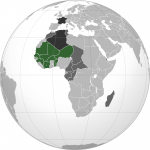
French West Africa
French West Africa was a federation of French colonies in West Africa that existed from 1895 until 1958. Created in stages, French West Africa eventually included eight colonies: SENEGAL, French Sudan (present-day MALI), GUINEA, IVORY COAST, Dahomey (present-day BENIN), Upper Volta (present-day BURKINA FASO), NIGER, and MAURITANIA. France established the federation to help coordinate French military efforts to dominate West Africa. […]
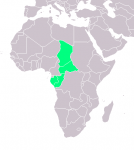
French Equatorial Africa
French Equatorial Africa was a French colony in the late 1800s and early 1900s, located in the area now occupied by the countries of CAMEROON, GABON, the CONGO (BRAZZAVILLE), the CENTRAL AFRICAN REPUBLIC, CHAD, and SUDAN. France administered the colony in a heavy-handed and inefficient manner. As a result, they did not get much benefit from their control over the […]
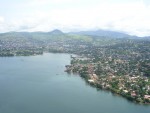
Freetown
Founded in 1787 as a colony for freed slaves, Freetown is the capital of SIERRA LEONE. It is also the country's chief port and largest city, with a population of about 500,000. Freetown's founders were British abolitionists, merchants, and bankers. They believed that the SLAVE TRADE could be replaced by other types of commerce and that Christianity could help repair […]
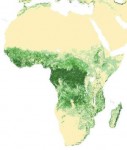
Forests and Forestry
Forests are one of Africa's most important natural resources, both for the influence they have in the continent's ecology and for their economic benefits. For thousands of years, the forests have provided habitats for a wide range of plants and animals. They have also served as a source of food, fuel, building materials, and trade goods for humans. Because of […]
Food and Drink
From the fish stew of Tunisia to the dried caterpillars of the Congo, African foods and eating customs vary according to the resources available. Religion and local custom have also played a role in determining diet. In many areas, traders and colonists from other continents introduced new foods and new ways of producing food. Throughout Africa the way people […]
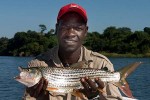
Fishing
In Africa fishing industries have long played a major role in commerce and in daily life. As early as the 1400s, dried, smoked, and salted fish were sold along trade routes that linked West Africa and the Sahel. By the 1500s commercial fishing was a significant industry. Fishing has also been a major source of food. Most Africans eat […]
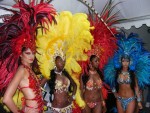
Festivals and Carnivals
Festivals and carnivals serve a multitude of social, religious, and political purposes. In Africa such events have been documented in travel books, museum displays, and studies of ethnic culture. Traditional celebrations also have been incorporated in dance and theater performances. Both scholars and the people who participate in festivals often view them as fixed traditions, handed down unchanged from generation to […]
Fasiladas
1632–1667 Emperor of Ethiopia Fasiladas stands out among historic emperors of ETHIOPIA because of his long reign and his impact on the country's political and religious policies. One of his first acts as emperor was to expel representatives of the Roman Catholic Church and to insist that only Ethiopian Orthodox Christianity could exist in his empire. Fasiladas founded a […]
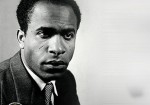
Fanon, Frantz
1925–1961 Algerian psychiatrist and theorist Born in the French West Indies, Frantz Fanon is considered one of the leading theorists of revolution of his time. After attending medical school in France, he served for three years as chief psychiatrist at a hospital in Blida, Algeria. Then he joined the National Liberation Front, a movement formed to free Algeria from French […]
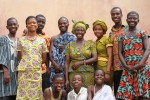
Family
Family plays a central role in African society. It shapes such daily experiences as how and where individuals live, how they interact with the people around them, and even, in some cases, whom they marry. It can determine a person's political identity and the way money and property are transferred. In rural areas, the family typically remains the basic unit […]
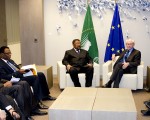
European Communities
Millions of Europeans live in communities scattered throughout Africa. Many of these communities date from the early decades of colonialism. In general, the numbers of European settlers in Africa gradually increased during the colonial period and then fell immediately after the colonies became independent nations. The population of SOUTH AFRICA includes more than 5 million Europeans, the largest community of Europeans […]
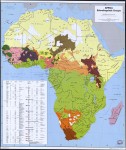
Ethnic Groups and Identity
Ethnic groups are populations that feel connected by a complex mix of kinship, culture, history, and geography. Together, the people in an ethnic group shape their ethnic identity—the sense of belonging to the group and sharing in its culture. Ethnic identity in Africa is as richly diverse as its people, and for most Africans it plays a central role in […]
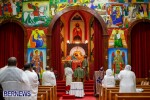
Ethiopian Orthodox Church
The Ethiopian Orthodox Church is the largest church in ETHIOPIA, with some 29 million members. The neighboring country of ERITREA has another 1.8 million members. This Christian church—also known by the name tewahido, meaning “unity”—separated from the Roman Catholic Church in A.D. 451 after the Council of Chalcedon. The council had declared that Jesus Christ had both a divine and […]
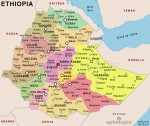
Federal Democratic Republic of Ethiopia
POPULATION: 96.51 million (2014) AREA: 435,184 sq. mi. (1,127,127 sq. km) LANGUAGES: Amharic (official); Gallinya, Tigrinya, Orominga, Somali, Italian, English NATIONAL CURRENCY: Birr PRINCIPAL RELIGIONS: Christian 40% (Ethiopian Orthodox), Muslim 45%, Traditional 15% CITIES: Addis Ababa (capital), 2,431,000 (1999 est.); Dessie, Dire Dawa, Harar, Gondar, Jimma, Mekele, Nazret ANNUAL RAINFALL: Varies from 104 in. (2,640 mm) in southwest to 4 in. (100 mm) in the […]
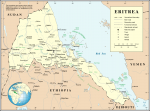
State of Eritrea
POPULATION: 6.536 million (2014) AREA: 46,774 sq. mi. (121,144 sq. km) LANGUAGES: Tigrinya (official); Afar, Arabic, Kunama, Tigre NATIONAL CURRENCY: Ethiopian birr PRINCIPAL RELIGIONS: Muslim 50%, Christian 50% (Coptic, Roman Catholic, Protestant) CITIES: Asmara (capital), 431,000 (1995 est.); Massawa, Assab, Keren, Agordat, Teseney, Adikwala, Addi Ugri ANNUAL RAINFALL: Varies from 18–29 in. (460–740 mm) in southern highlands to 12–14 in. (310–360 mm) in eastern […]
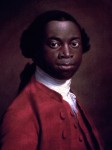
Equiano, Olaudah
ca. 1740s–1797 Abolitionist writer Olaudah Equiano, a former slave, became a forceful voice in the antislavery movement. His autobiography had considerable influence on British public opinion. Born in the kingdom of Benin to an IGBO family, Equiano was captured by slave traders at the age of ten. Later a British naval officer renamed him Gustavus Vassa and took him […]
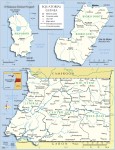
Republic of Equatorial Guinea
POPULATION: 778,100 (2014) AREA: 10,800 sq. mi. (27,972 sq. km) LANGUAGES: Spanish, French (both official); Bubi, Fang, Ibo, Ndowe NATIONAL CURRENCY: CFA Franc PRINCIPAL RELIGIONS: Christian (mostly Roman Catholic) 79%; Traditional 21% CITIES: Bata (capital), 24,100; Malabo, Luba, Moca, Nietang, Evinayong ANNUAL RAINFALL: 79 in. (2,000 mm) ECONOMY: GDP $14.31 billion (2014) PRINCIPAL PRODUCTS AND EXPORTS: Agricultural: cocoa, timber, coffee, bananas, fish, sweet […]
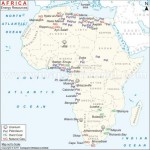
Energy and Energy Resources
Africa's resources include an abundant supply of petroleum, natural gas, and wood for fuel. The continent also has numerous rivers and waterfalls that could provide hydroelectric power. But Africans rely mostly on wood for energy. Most of the continent's other resources are expensive, available only in small quantities, and in limited areas. For a number of reasons, the development of […]
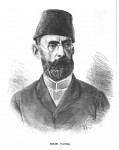
Emin Pasha
1840–1892 Explorer and colonial governor In the late 1800s, a European known as Emin Pasha became the object of a much-publicized rescue operation in Africa. During this time, the European powers were deeply involved in Africa. Emin, a provincial governor in the Egyptian colony of SUDAN, had been stranded by a religious war. Born Eduard Schnitzer in what is now […]
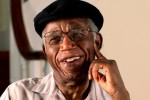
Ekwensi, Cyprian
1921–207 Nigerian writer Cyprian Ekwensi has won fame for his books about urban life in modern Africa. Born into an IGBO family in northern NIGERIA, he was educated at Ibadan University College in Nigeria and at the Chelsea School of Pharmacy in London. He spent his early career working in communications in the Nigerian civil service. Ekwensi turned to […]
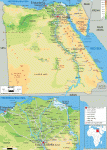
Arab Republic of Egypt
POPULATION: 83.39 million (2014) AREA: 386,200 sq. mi. (1,000,258 sq. km) LANGUAGES: Arabic (official); English, French NATIONAL CURRENCY: Egyptian Pound PRINCIPAL RELIGIONS: Muslim 94%, Coptic Christian 6% CITIES: Cairo (capital), 10,552,000 (2000 est.); Alexandria, Shubra El-Khemia, Giza, Aswan ANNUAL RAINFALL: Varies from 7 in. (178 mm) along the coast to virtually rainless along the Red Sea coastal plain and Western Desert. ECONOMY: GDP […]

Egypt, Ancient
The Egyptian civilization that arose along the banks of the NILE RIVER in ancient times was one of the longest-lasting in world history. For nearly 3,000 years, Egypt dominated the northeastern corner of Africa. The ancient Egyptians interacted with the peoples of the Near East and the Mediterranean. At the same time, they traded goods and maintained relations with groups […]
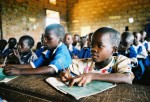
Education
In the modern world no country can hope to prosper and advance without an educated population. During most of the colonial period, Africa's black population was systematically denied access to quality schooling and higher education. After gaining independence, most African states made it a priority to strengthen their educational systems. That process has not always been smooth, and serious problems remain. […]
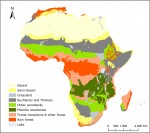
Ecosystems
An ecosystem is a closely woven web of plant and animal life within a particular type of physical environment. Africa has five main kinds of ecosystems: coastal environments, deserts and semideserts, mountain environments, savanna grasslands, and forests. Each ecosystem has its typical environment and climate, and the people who live there have adapted to its conditions and learned to use […]
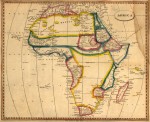
Economic History
Alack of written sources makes it difficult to trace the early economic history of much of the African continent, especially sub-Saharan Africa. What is clear is that Africans in precolonial times had basic economic activities that provided them with the things they needed to survive. At the same time, however, many factors limited the kind of intensive economic development […]
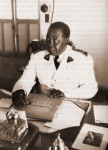
Eboue, Adolphe-Felix-Sylvestre
1884–1944 Colonial administrator Adolphe-Felix-Sylvestre Eboue was a Creole official who served France in a variety of colonial posts during the early 1900s. He is most famous for bringing several French colonies in Africa into World War II to fight on the side of the Allies. Born in French Guyana in South America, Eboue attended a school of colonial administration, […]
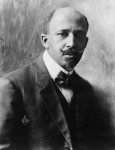
Du Bois, W.E.B.
1868–1963 Father of Pan-Africanism William Edward Burghardt Du Bois was a leading champion of equality for blacks in the United States and elsewhere. An African American born in Massachusetts, Du Bois attended college and earned a Ph.D. degree from Harvard University. In the early 1900s, he became a black civil rights leader. Du Bois was known for his view […]
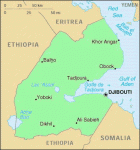
Republic of Djibouti
POPULATION: 886,300 (2014) AREA: 8,500 sq. mi. (22,000 sq. km) LANGUAGES: French, Arabic (both official); Afar, Somali NATIONAL CURRENCY: Djibouti Franc PRINCIPAL RELIGIONS: Muslim 94%, Christian 6% CITIES: Djibouti (capital), 383,000 (1999 est.); Ali Sabieth, Dikhil, Tadjoura, Obock ANNUAL RAINFALL: Less than 5 in. (127 mm) ECONOMY: GDP $1.582 billion (2014) PRINCIPAL PRODUCTS AND EXPORTS: Agricultural: goats, sheep, camels, cattle, coffee Manufacturing: […]
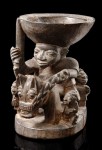
Divination and Oracles
Throughout much of Africa people turn to divination for guidance in resolving their troubles. The act of divination involves advice, an explanation, or a prediction for the future—all of which are considered messages from the spiritual world. Many Christian and Muslim Africans do not see divination as conflicting with their faiths. Their approach to understanding life and solving its problems […]

Diseases
Poverty and the scarcity of adequate health services have combined to make disease a particularly severe problem throughout Africa. Africans have to deal with many of the same illnesses that affect people in other parts of the world. They suffer from infectious diseases such as measles, lifestyle-related illnesses such as cancer and heart disease, and sexually transmitted diseases (STDs). However, […]
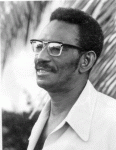
Diop, Cheikh Anta
1923–1986 African scholar and political leader Cheikh Anta Diop was an accomplished historian, physicist, archaeologist, and linguist who championed the cause of African independence and explored the roots of African culture and civilization. Born to a Muslim family in SENEGAL and educated in both Africa and France, Diop had an unusual background from which to examine Africa's colonial experience. While doing […]
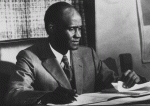
Diop, Alioune
1910–1980 Writer and cultural leader The Senegalese writer Alioune Diop played a major role in changing the way the French-speaking world viewed Africa. Born and educated in SENEGAL, Diop worked as a professor and represented the colony in the French Senate. In 1947 he started Presence africaine, which became the most influential French-language journal on Africa. In Presence africaine, […]

Dingiswayo
1770s–1816 Chief of the Nguni confederation Dingiswayo was the last chief of the Nguni confederation of southern Africa before Europeans colonized the area. According to legend, Dingiswayo became chief by killing his brother because he believed that his brother was not the rightful ruler. After assuming power, Dingiswayo combined several related kingdoms into a unified confederation. He then appointed subchiefs from […]
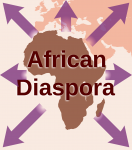
Diaspora, African
Today, Africans and their descendants are found on every inhabited continent. African traditions have influenced religion and art, and popular music the world over owes much to African rhythms and musical styles. This global presence is due largely to the African diaspora—a movement of people of African descent to areas outside their homeland. The story of the African diaspora […]
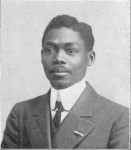
Diagne, Blaise
1872–1934 Senegalese politician The Senegalese politician Blaise Diagne was the first African elected as a deputy to the French National Assembly in Paris. Like all Africans born in SENEGAL during the colonial period, Diagne was an originaire—a French citizen with certain limited rights. Educated in France and at the University of Saint-Louis in Senegal, he worked in Africa […]
Development, Economic and Social
In general, development refers to a process by which countries use their natural and human resources to improve the economy and the lives of their people. Many experts also study development in terms of its outcome—the results that are achieved through economic, political, and social programs. A complex concept, development includes economic measures such as income and economic production, political measures […]
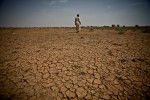
Deserts and Drought
Africa contains two desert regions, the SAHARA DESERT in the north and the Namib-Kalahari region in the southwest. Traditionally, very few people have lived in Africa's deserts. However, some groups inhabit the semiarid lands bordering deserts—areas that are somewhat wetter than the desert. The well-being of these people depends on rainfall, which varies greatly from year to year. With an […]
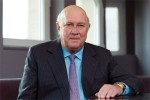
De Klerk, Frederik Willem
1936– South African political leader Frederik Willem De Klerk served as president of SOUTH AFRICA from 1989 to 1994. He was the driving force behind government efforts to end the country's official system of race discrimination known as APARTHEID. De Klerk was raised in a political environment. His father was a cabinet minister who served as president of South […]
Death, Mourning, and Ancestors
People who die are not buried in a field, they are buried in the heart,” goes a saying of the central African nation of RWANDA. Death of course is more than the physical fact of a life's end. It also brings emotional and social change to families and communities. Africans mark those changes with rituals that draw on traditional beliefs […]

Dar es Salaam
Dar es Salaam (which means “haven of peace” in Arabic) is the capital and largest city in TANZANIA. In the late 1990s, its population was about 1.5 million. Arabs from Southern Arabia first established fishing villages in the area during the A.D. 1600s, but the city did not really grow until Sultan Sayyid Majid of ZANZIBAR built a palace […]
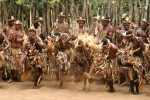
Dance
Through dance, African people celebrate, worship, educate, and express social organization. Styles vary greatly from culture to culture, but most African dance shares some common features. In particular, it emphasizes rhythm. Elements of traditional dance and music often blend with contemporary or foreign styles to create new kinds of African dance. Purposes of Dancing In all African cultures, dance is […]
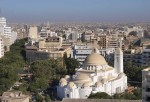
Dakar
Dakar, the capital and largest city in SENEGAL, is one of the most important ports of West Africa. The Portuguese landed near the site of modern Dakar in 1444, and several European powers fought over the region until the French gained control in the mid-1600s. The area was originally valued as a source for slaves. After the banning of […]
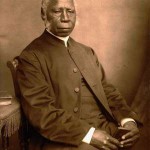
Crowther, Samuel Ajayi
ca. 1806–1891 Anglican bishop Samuel Ajayi Crowther was an educated traveler, translator, and missionary who was named the first African bishop in the Anglican Church. Born in what is now NIGERIA, Crowther was captured and sold into slavery at the age of 12. A British antislavery ship rescued him at sea, however, and took him to FREETOWN, SIERRA LEONE. […]
Creoles
In Africa, the term Creole refers to any people with some mix of African and non-African racial or cultural heritage. Creole populations can be found on most African islands and along many of the continent's coasts, areas where Africans first mingled with Europeans and Arabs. From these contacts, six major Creole types emerged: Portuguese, black American, French, Dutch, British, and […]
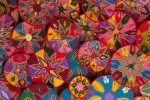
Crafts
For centuries Africans have produced handmade items such as cloth, baskets, and pottery to meet the practical needs of everyday life. Such handicrafts are also expressions of their makers' skills and of personal, regional, and cultural styles. Many are produced specifically for sale or for export to markets in other countries. Basketry Both men and women make many kinds […]
Correia, Mae Aurelia
Early 1800s Trader in Guinea-Bissau Mae Aurelia Correia was a wealthy and powerful trader in the GUINEA-BISSAU region from the 1820s to the 1840s. Among the many women traders of African or mixed ancestry at the time, Mae Aurelia was the most successful. Little information exists about Mae Aurelia's birth and family because the Portuguese colonial authorities in Guinea-Bissau […]
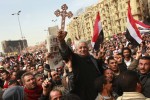
Copts
The Copts, a Christian sect in EGYPT, trace their history back almost 2,000 years. They follow customs and beliefs that they adopted long before Islam, the dominant religion in Egypt today, arrived in the region. According to tradition, Christianity was introduced to Egypt in the A.D. 40s. The city of ALEXANDRIA became a center of Christian scholarship, and the religion […]
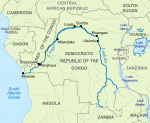
Congo River
For centuries the Congo River has played a key role in trade, travel, and exploration in equatorial Africa. The Congo and its many tributaries form the largest system of navigable waterways in Africa. For local peoples, the river is a vital highway of commerce and communication. The Congo flows for 2,900 miles in a great curve through the […]
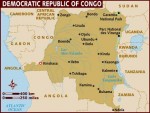
Democratic Republic of the Congo
POPULATION: 69.36 million (2014) AREA: 905,560 sq. mi. (2,345,410 sq. km.) LANGUAGES: French (official); Kongo, Lingala, Swahili, Tshiluba, Ngwana NATIONAL CURRENCY: Congolese franc PRINCIPAL RELIGIONS: Christian 80% (Roman Catholic 50%, Protestant 20%, Kimbanguist 10%), Muslim 10%, Traditional 10% CITIES: Kinshasa (capital), 5,064,000 (2000 est.); Kisangani, Lumbumbashi, Kanaga, Likasi, Mbandaka, Mbuji-Mayi, Bukavu ANNUAL RAINFALL: Varies from 30–60 in. (800–1500 mm) in south to 80–118 in. (2,000–3,000 […]
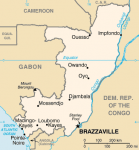
Republic of Congo
POPULATION: 4.559 million (2014) AREA: 132,000 sq. mi. (342,000 sq. km) LANGUAGES: French (official); Kongo, Lingala, Teke, Monkutuba, other Bantu dialects NATIONAL CURRENCY: CFA franc PRINCIPAL RELIGIONS: Christian (mostly Roman Catholic) 50%, Traditional 48%, Muslim 2% CITIES: Brazzaville (capital), 1,004,000 (1999 estimated population); Pointe-Noire, Kayes, Loubomo, Ouesso, Impfondo, Fort Rousset, Djambala ANNUAL RAINFALL: Varies by region, averaging about 60 in. (1,520 mm) per year ECONOMY: […]
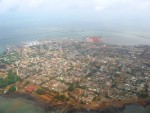
Conakry
Conakry, capital of GUINEA, lies at the tip of the Kaloum Peninsula on the western coast of Africa. The surrounding land is swampy, and its climate is tropical. During the rainy season, about 144 inches of rain fall in five months. About 1 million people live in the city. In the 1200s and 1300s, Conakry was part of the […]
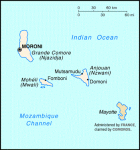
Federal Islamic Republic of the Comoros
POPULATION: 752,400 (2014) AREA: 838 sq. mi. (2,170 sq. km) LANGUAGES: French, Arabic (official); Comoran (a Swahili dialect) NATIONAL CURRENCY: Comorian franc PRINCIPAL RELIGIONS: Sunni Muslim 86%, Roman Catholic 14% ISLANDS: Grand Comore (Ngazidja), Anjouan (Nzwani), Moheli (Mwali), Mayotte (Maore); Capital: Moroni, 30,000 (1999 est.) ANNUAL RAINFALL: Varies from 43–114 in. (1,100–2,900 mm) ECONOMY: GDP $647.7 million (2014) PRINCIPAL PRODUCTS AND EXPORTS: Agricultural: vanilla, […]
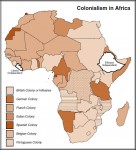
Colonialism in Africa
Colonialism, which refers to the establishment of political and economic control by one state over another, had an enormous impact on Africa. The colonial experience began in the late 1400s, when Europeans arrived and set up trading posts in Africa. It reached a peak in the late 1800s and early 1900s, when European powers dominated many parts of the continent. […]
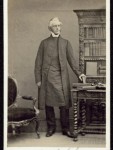
Colenso, John William
1814–1883 British missionary John Colenso was an outspoken critic of conventional missionary work who condemned the way colonial authorities treated Africans. Born in England, Colenso became the first bishop of the Diocese of NATAL in 1853 and established a mission station in the town of Bishopstowe. He was well-read in both Christian teaching and modern scientific thinking and discoveries. He […]

Coetzee, J. M.
1940– South African novelist The South African writer and literary critic John Michael Coetzee is known for novels that explore the effects of apartheid in his homeland. Coetzee studied at the University of Cape Town and at the University of Texas, where he received a Ph.D. in literature. He then returned to SOUTH AFRICA despite his opposition to the […]
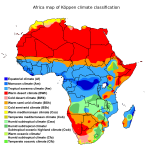
Climate
The diverse climates of Africa range from scorching deserts to icy glaciers, from steamy rainforests to grassy plains. Climate is a long-term weather pattern, the sum of features such as temperature, rainfall, and wind. The amount of heat from the sun plays a major role in determining climate. The equator receives more solar heat than any other part of the […]

Cleopatra
69–30 B.C. Egyptian queen Cleopatra, one of the most famous figures of ancient history, was the last ruler of EGYPT in the tradition of the pharaohs who had governed the land for several thousand years. She came to the throne in 51 B.C. as the wife of her brother, Ptolemy XIII. For several hundred years before that time, […]
Class Structure and Caste
African societies, like those in nearly all areas of the world, are divided into various groups or classes. Each class has its own distinct characteristics, roles, privileges and limitations, and relations with other groups. Only a few societies based on hunting and gathering have no formal division into classes. The class structure of African societies today is a patchwork. […]
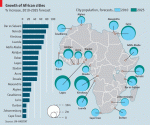
Cities and Urbanization
he image of Africa as a continent of traditional villages and small towns has never been correct. Africa has always included both highly urban and rural settlements. However, its cities have grown dramatically in recent years, and some researchers who study population trends have predicted that by the early 2000s about half of all Africans will live in urban areas. […]
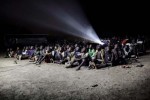
Cinema
eople in Africa have been watching, acting in, and making movies since the early 1900s. Until the 1950s, films were generally controlled by European colonial powers. The colonial governments oversaw production and decided which movies could be shown to the public. In the years since African nations gained independence, Africans have developed their own cinema with their own directors and […]
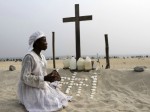
Christianity in Africa
African Christianity goes back to very early times, and the Christianity that developed in Africa influenced the religion's later growth in Europe. However, African Christianity ultimately developed its own special character in which local traditions played a role. This religion has had a profound effect on the social and political development of modern Africa. Today, membership in Christian churches is growing […]
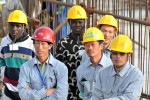
Chinese in Africa
From the late 1700s to the early 1900s, Chinese traders and laborers traveled to southern and eastern Africa to earn a living in the colonies established by Europeans. A large number of Chinese also moved to African islands such as MAURITIUS, REUNION, and MADAGASCAR. A second wave of immigrants settled in Africa in the 1920s and 1930s, a time of […]
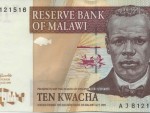
Chilembwe, John
1871–1915 Malawian nationalist John Chilembwe was a church leader and opponent of European colonialism in Africa. His activities helped inspire the independence movement in his country of MALAWI and nationalism in Africa. Schooled at a Scottish Presbyterian mission in Malawi, Chilembwe broke with the Presbyterians in 1892 after meeting Baptist missionary Joseph Booth. Booth took Chilembwe to the United States […]
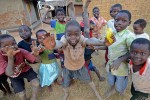
Childhood and Adolescence
For most Africans in the past, growing up meant helping the family produce food, learning the community's values, and gradually taking on new tasks, privileges, and responsibilities. After about 1900, however, patterns of childhood education and socialization began to change. Three major influences for change have been Western-style schooling, religious schooling in the Islamic nations of northern Africa, and the growth […]
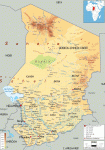
Republic of Chad
POPULATION: 13.21 million (2014) AREA: 495,792 sq. mi. (1,284,000 sq. km) LANGUAGES: French, Arabic (official); Sara, Sango, others NATIONAL CURRENCY: CFA franc PRINCIPAL RELIGIONS: Muslim 50%, Traditional 25%, Christian 25% CITIES: N'Djamena (capital), 826,000 (1999 est.); Sarh (Fort Archambeault), Moundou, Bongor, Doba, Lai, Abeche, Koumra ANNUAL RAINFALL: Variable, from 35–47 in. (900–1200 mm) in subtropical zone to 18–20 in. (200–500 mm) in Saharan zone […]
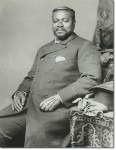
Cetshwayo
1832–1884 Zulu king Cetshwayo kaMpande was king of Zululand, in southeastern Africa, from 1872 to 1879 and again from 1883 to 1884. Although he fought with great skill and courage to keep his kingdom free and undivided, his efforts were overwhelmed by British colonial forces. During his early reign, Cetshwayo developed ties with Britain's coastal colony of Natal. He […]
Central African Republic
POPULATION: 4.709 million (2014) AREA: 240,324 sq. mi. (622,436 sq. km) LANGUAGES: French (official); Sango, Arabic NATIONAL CURRENCY: CFA franc PRINCIPAL RELIGIONS: Christian 50%, Traditional 24%, Muslim 15%, Other 11% CITIES: Bangui (capital), 524,000 (1999 est.); Baoli, Berberati, Bambari, Bossagoa, Carnot ANNUAL RAINFALL: Varies from 75 in. (1900 mm) in the south to 0.2 in. (50 mm) in the extreme northeast ECONOMY: GDP […]

Central African Federation
The Central African Federation was created in 1953 by the union of the British colonies of Northern and Southern Rhodesia and Nyasaland. Politicians had two reasons for forming this federation. One was to gain access to the copper mines of Northern Rhodesia and the cheap labor of Nyasaland. The other was to calm the fears of white settlers who were […]
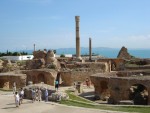
Carthage
Carthage, a rich and powerful city of the ancient world, once dominated the coast of North Africa. It stood on a peninsula in what is now TUNISIA, with a good harbor on each side. At one time the city controlled an empire that included North Africa, southern Spain, the Mediterranean islands of Sardinia and Corsica, and part of Sicily. […]
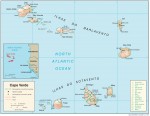
Cape Verde
The nation of Cape Verde (also known as Cabo Verde) consists of 15 islands about 400 miles off the coast of SENEGAL. Although the name means “Green Cape,” the islands actually have a hot, dry climate and very little arable land. The capital city of Praia is on the island of Santiago Before its discovery by the Portuguese in 1460, […]
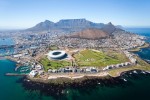
Cape Town
Located about 30 miles north of the Cape of Good Hope, Cape Town is the oldest city in SOUTH AFRICA. With its many gardens, parks, beaches, historical buildings, and mountains, it is considered one of the most beautiful cities in the world. Cape Town (known as Kaapstad in Afrikaans) was founded in 1652 as a supply station for Dutch […]

Cape Coloured People
Cape Coloured People are the mixed race population of various towns in Cape Province, SOUTH AFRICA. They are descendants of Dutch, British, and Kxoe people (various non–Bantu-speaking groups of southern Africa), as well as of slaves brought from MADAGASCAR and East Asia. Until the late 1950s, when apartheid policies were adopted in South Africa, most of the Cape Coloured lived […]

Canaries
The Canaries are a group of seven volcanic islands that lie off the northwestern coast of Africa. The westernmost islands are actually the peaks of mountains that rise from the ocean floor to heights several thousand feet above sea level. The eastern Canaries are much flatter. Gran Canaria and Tenerife are the two most important islands. The Canaries have […]
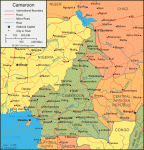
Republic of Cameroon
POPULATION: 22.82 million (2014) AREA: 183,568 sq. mi. (475,400 sq. km) LANGUAGES: French, English (official); Bantu dialects (24) NATIONAL CURRENCY: CFA franc PRINCIPAL RELIGIONS: Traditional 51%, Christian 33%, Muslim 16% CITIES: Yaounde (capital) 1,119,000 (1999 est.); Douala, Nkongsamba, Maroua, Bafoussam, Foumban, Garoua, Limbe, Bamenda, Kumba ANNUAL RAINFALL: Varies by region from 23 in. (600 mm) in the extreme north to 390 in. (10,000 mm) […]
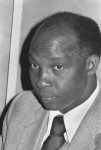
Camara Laye
1928–1980 Guinean author Camara Laye is one of Africa's best-known and most respected francophone (French-speaking) authors. His first novel, L'enfant noir (The Black Infant) is also one of his most popular. Written in 1953, the book tells of Camara's childhood in the town of Kouroussa, GUINEA. On the one hand, it is a personal account of the author's Mande […]
Calendars and Time
In African cities, many people use the Western system of clocks and calendars for official and business purposes. They divide the day into 24 hours and the year into 12 months based on the earth's movement around the sun. As in the West, a general system of dating is used to create a common framework for past events from […]

Cairo
Cairo is the capital of EGYPT and the largest city in Africa. The city's strategic location on the NILE RIVER has made it a defensive stronghold for Egypt for nearly 1,500 years. In medieval times, Cairo was one of the busiest centers of trade and education in the Mediterranean and Middle East. Today the city remains a vibrant hub […]
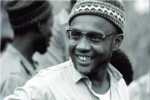
Cabral, Amilcar Lopes
1924–1973 Political and revolutionary activist Born in the Portuguese colony of GUINEA (later, GUINEA-BISSAU), Amilcar Lopes Cabral went to Portugal to study. After graduating from the University of Lisbon, he returned home a revolutionary leader, and he brought about Guinea-Bissau's independence. Cabral believed that people who opposed oppression should take action and commit themselves to social reform. He won respect […]
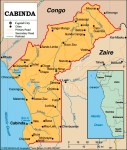
Cabinda
Cabinda, a province of the country of ANGOLA, is separated from Angola by a narrow strip of land belonging to the CONGO (KINSHASA). Though small in size (about 2,800 sq. miles), Cabinda has figured prominently in the economics and politics of the region for many years—particularly because of its valuable oil fields. Europeans visited the region in the 1500s […]
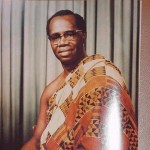
Busia, Kofi A.
1913–1978 Prime minister of Ghana Born into African royalty, Kofi A. Busia was elected prime minister of GHANA in 1969 and led his country for a brief period. In addition to politics, Busia focused on philosophy and economics. He earned a doctoral degree from Oxford University in England and wrote many books, including Africa in Search of Democracy (1967). […]
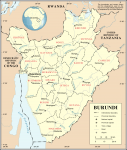
Republic of Burundi
POPULATION: 10.48 million (2014) AREA: 10,747 sq. mi. (27,834 sq. km) LANGUAGES: Rundi, French (both official); Swahili NATIONAL CURRENCY: Burundi franc PRINCIPAL RELIGIONS: Christian 67%, traditional 32%, Muslim 1% CITIES: Bujumbura (capital), 300,000 (1994 est.); Gitega, Ngozi, Kayanza, Mwaro ANNUAL RAINFALL: Ranges from 1,194 mm (47 in.) on the plateaus to 762 mm (30 in.) in lower areas ECONOMY: GDP $3.094 billion (2014) […]
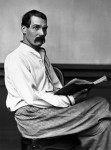
Burton, Sir Richard Francis
1821–1890 British explorer Sir Richard Francis Burton made four journeys in Africa in the mid-1800s. Although he failed in his mission to locate the source of a branch of the Nile River, he contributed greatly to European knowledge of African geography. Born in Torquay, England, and raised in France and Italy, Burton served in the British army in […]
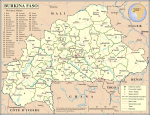
Burkina Faso
POPULATION: 17.42 million (2014) AREA: 105,869 sq. mi. (274,200 sq. km) LANGUAGES: French (official); Mossi, Dyula, many local languages NATIONAL CURRENCY: CFA Franc PRINCIPAL RELIGIONS: Muslim 50%, traditional 40%, Christian 10% CITIES: Ouagadougou (capital), 1,100,000 (2000 est.); Bobo-Dioulasso, Koudougou, Ouahigouya, Kaya, Banfora ANNUAL RAINFALL: Varies from 40 in. (1,000 mm) in the south to less than 10 in. (250 mm) in the […]

Brink, Andre
1935–2015 South African novelist Andre Phillipus Brink is a South African novelist who writes in both Afrikaans and English. He became known as known one of the “Sixtyers,” writers of the 1960s who wanted to revolutionize South African fiction by addressing social, moral, and political issues. Born in SOUTH AFRICA, Brink was educated both there and in France. His […]
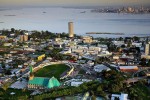
Brazzaville
The city of Brazzaville is the capital of the Republic of Congo and one of the country's main industrial centers. It sits on the west bank of the Malebo Pool at the beginning of the navigable portion of the Upper CONGO RIVER, a place known as “the gateway to the heart of Africa.” Founded by the French in 1883, […]
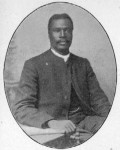
Braide, Garrick Sokari
ca. 1882–1918 Nigerian religious leader Garrick Sokari Braide, a Nigerian missionary and prophet, was largely responsible for the spread of Christianity in the Niger Delta region of Africa in the early 1900s. His preaching and methods combined traditional African elements with Christianity and stressed prayer and faith healing. Braide was born in the village of Obonoma, the center of […]
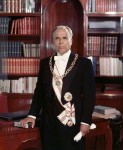
Bourguiba, Habib
1903–2000 President of Tunisia Habib Bourguiba, son of a former Tunisian army officer, grew up under French colonial rule in TUNISIA. He was a leader in his country's independence movement and became its first president in 1957. After receiving a good education in Tunisia, young Bourguiba studied law in Paris. There he met other North Africans who were […]

Boundaries in Africa
Before the arrival of European colonists, African boundaries were very loosely defined. Borders reflected the territories inhabited and controlled by different ethnic groups, and they often changed over time—generally as a result of migration or conquest. Moreover, these boundaries did not define all the available space in Africa. Some areas remained unclaimed or served as neutral zones between indigenous ethnic […]

Boumedienne, Houari
ca. 1927–1978 President of Algeria Hoauri Boumedienne was the first vice president of ALGERIA after it won independence from France in 1962. Three years later, he led a coup against President Ahmed BEN BELLA. Boumedienne became Algeria's president and remained in that position until his death. In his youth, Boumedienne was involved in the movement for Algerian independence. He rose […]
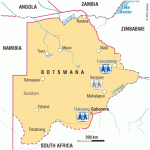
Republic of Botswana
POPULATION: 2.039 million (2014) AREA: 231,804 sq. mi. (600,372 sq. km) LANGUAGES: English, Setswana (both are official) NATIONAL CURRENCY: Pula PRINCIPAL RELIGIONS: Christian 50%, traditional 50% CITIES: Gaborone (capital), 134,000 (1999 est.); Serowe, Francistown, Lobatse, Selibi-Phikwe, Kanye, Maun, Molepolole, Ramotswa, Mochudi, Ghanzi ANNUAL RAINFALL: Varies from 18–25 in. (460–625 mm) in the extreme northwest to less than 5 in. (125 mm) in the extreme […]
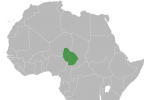
Bornu
The empire of Bornu existed in north central Africa from about 1400 to 1900, when it became part of Britain's colonial empire. Bornu had its origins in an earlier state named Kanem that arose around 1200 in what is now southwestern CHAD. The leaders of Kanem were divided into two competing dynasties: the Duguwa and the Sayfuwu. Driven out […]
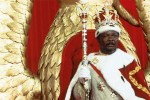
Bokassa, Jean-Bedel
1921–1996 President of the Central African Republic Military leader Jean-Bedel Bokassa became the president of the CENTRAL AFRICAN REPUBLIC after a coup in 1966. Eleven years later, he had himself declared emperor and renamed the country the Central African Empire. The son of a village chief, Bokassa began his military career in the French army in 1939. He fought […]
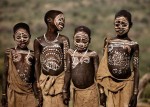
Body Adornment and Clothing
People communicate information about themselves by the clothes they wear and the way that they adorn their bodies. In Africa body decoration and dress may offer clues to a person's age, ethnic group, region, social position, and even political opinions. As Western-style attire becomes more common in Africa, some traditional types of adornment and dress are fading from everyday use—especially […]
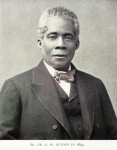
Blyden, Edward Wilmot
1832–1912 Pioneer of Pan-African Unity Edward Blyden was a teacher and author who promoted the idea of black African pride. He stressed the importance of African languages and culture but also explored the possibility of combining African and Western cultures. The inventor of the phrase “African personality,” Blyden laid the groundwork in his writings for the NEGRITUDE movement of the […]
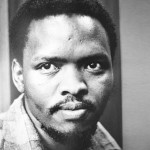
Biko, Steve
1946–1977 South African social activist Steve Biko, an outspoken opponent of apartheid, earned fame as a leader of the black consciousness movement in the 1960s and 1970s. The movement was based on the belief that the divisions between whites and blacks in South Africa were so great that blacks could not count on whites to end apartheid. Biko also […]
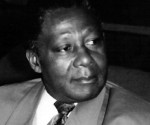
Beti, Mongo
1932–2001 Cameroonian novelist Mongo Beti is Cameroon's most celebrated novelist. His early novels usually explore the conflict between traditional African values and those of European colonialists. His best-known works, published in the 1950s, feature characters who come to understand the injustice of colonial rule and to realize they must help end it. Beti's most famous novel, Le Pauvre Christ […]
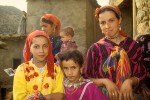
Berbers
The Berbers are a cluster of peoples who live in North Africa and in the northern parts of the Saharan countries of MALI, NIGER, and MAURITANIA. The Berbers have their own languages, which belong to the Hamitic or Afro-Asiatic language family, and they write in their own scripts. The native people of the region, the Berbers resisted the Arab […]
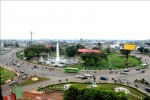
Benin City
Located in the Bendel State of southern NIGERIA, Benin City is famous for the work of its numerous artisans. Despite its name, the city is not related to the nation of BENIN, which lies west of Nigeria. Around A.D. 1000 a center of regional importance arose on the site of the present Benin City. This early town, also known […]
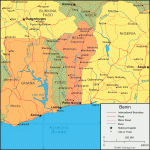
Republic of Benin
POPULATION: 10.60 million (2014) AREA: 43,483 sq. mi. (112,620 sq. km) LANGUAGES: French (official); Fon, Yoruba, Adja, Banba NATIONAL CURRENCY: CFA franc PRINCIPAL RELIGIONS: traditional 70%, Christian 15%, Muslim 15% CITIES: Porto Novo (capital), 330,000 (1999 est.); Cotonou, Abomey, Ouidah, Parakou, Natitingu ANNUAL RAINFALL: Varies from 58 in. (1,500 mm) in the southeast to 30 in. (770 mm) in the extreme north ECONOMY: GDP […]
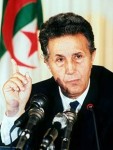
Ben Bella, Ahmed
1916–2012 First president of Algeria Aleading figure in Algeria's struggle for independence from France, Ahmed Ben Bella served as the country's first president from 1963 to 1965. Educated at a French primary school near Oran, ALGERIA, he became involved with the independence movement while pursuing further studies in the nearby city of Tlemcen. During World War II he served in […]